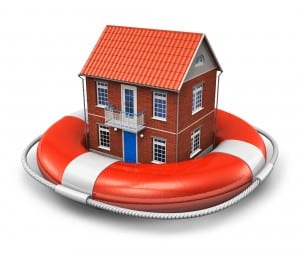If You Own a Rental Property Make Sure You Have the Right Insurance
In recent years, a growing number of homeowners have decided to become landlords. It started during the housing crisis in the late-2000s, when many homeowners found themselves “upside-down” on the mortgage, owing more than the home was worth. As property values have recovered, some have decided that renting is better than selling because it gives them an investment property that appreciates in value and can pay off in the long run. However, you may not know the importance of rental insurance. 
Whatever the reason for becoming a landlord, it is important to understand what type of insurance you need on your property. Homeowner insurance and rental (investment) property insurance are similar products. Both insure the property for fire and other hazards, and both have liability components. There are some important differences, however, that landlords need to consider.
Here are some of the areas of coverage that are specific to rental properties, and can most often be provided as an add-on with an investment property insurance policy:
Builder’s Risk: Rental properties can be subjected to a lot of wear and tear over time. If you are planning on having this investment property for the long-term, there is a good chance you will need to do some remodeling and renovations. Make sure your policy provides coverage for construction-related losses, so you do not expose yourself to potential losses while fixing up your property.
Vacant Property Coverage: When one tenant moves out, there is sometimes a waiting period before another moves in. During this time, the property sits vacant with nobody there to ensure it stays secure. Your investment property insurance policy should provide coverage for intervals when the home is unoccupied.
Loss of Rental Income: A fire, storm or other covered loss can make the home unlivable for an extended length of time. During this time, not having rental income can make it very difficult to pay the mortgage. Loss of income coverage ensures you will not fall into a financial hole if your tenants are forced to move out for a while.
Tenant/Guest Liability: In general, if a tenant is negligent and his/her carelessness leads to the injury of a guest, the tenant is liable. There are some gray areas, however, in which this responsibility could fall on the landlord. For example, if the landlord is responsible to have the driveway plowed in the winter, and the tenant is responsible to shovel the sidewalk, it may be difficult to determine who is responsible if a guest or passer-by slips and falls because the driveway/sidewalk area was not cleared.
Personal Property: A typical homeowner policy provides insurance for your contents as well. Full personal property coverage is not necessary for rental properties. You do, however, need to make sure you are covered for the damage or loss of any appliances or other furnishings you happen to own.
Owning a rental property can be a wise investment, but it is important to make sure you are not underinsured (or over-insured) on the property. To find the right investment property insurance policy, speak with an independent insurance broker. Independent agents work with several of the top insurance carriers in your state. They can do the shopping for you in an objective way and find the right policy to fit your needs and budget.




